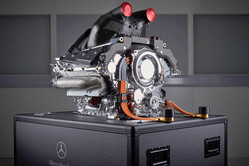


25/11/2020
NEWS STORY
 Though the current formula is due to run until 2025, the sport is already looking to 2026 and beyond. While F1 has made clear that the hybrid formula will remain, in its determination to improve sustainability the sport is planning to introduce bio-fuels.
Though the current formula is due to run until 2025, the sport is already looking to 2026 and beyond. While F1 has made clear that the hybrid formula will remain, in its determination to improve sustainability the sport is planning to introduce bio-fuels.
While there is no denying the amazing job the manufacturers have done in terms of the efficiency, sustainability and sheer technical genius of the hybrid power units they have come at a cost, and as the sport looks beyond 2025, Toto Wolff warns that costs remain the most important factor.
"The discussion was very good, one of the positives" said Wolff, when asked about how talks are progressing.
"It's interesting where the auto industry goes, because everything develops in the direction of electric mobility, but there is also a new look at the internal combustion engine and the combination with electric drive."
At a time some are suggesting the 'new' formula should be introduced sooner than 2026, and that it should be 'simplified' in order to reduce costs and hopefully encourage new manufacturers on-board, Wolff insists that cost is the key.
"I believe we should look at the costs," says the Austrian. "Developing a completely new power unit is not somewhere we should go.
"We know that we made that mistake in 2011 and 2012 when we made a highly sophisticated and also very efficient power unit," he continues, "but it got very complex.
"As things stand I think we need to have a combination of what we have today - an internal combustion engine and add hybrid energy and power in order to have a better ratio between sustainable energy propulsion and conventional ICE engines.
"I don't think it's about simplifying," he admits, "it's just about trying to not have escalating costs, and apart from the more electric component with potentially larger or more powerful battery pack, sustainable fuels are definitely the future.
"In 2025 we should have a 100% sustainable fuel, whether it's synthetic fuels or biofuels, but it should come with a big step for 2025 and not with a gradual increase over the next years because again that would make the power unit development more expensive."
Speaking to investors last week, out-going F1 boss, Chase Carey reiterated the sport's determination to achieving carbon neutrality by 2030, with the 2026 formula set to play a key role.
"At the top of our priorities for both sustainability and our sport is building a road map for the combustion engine that addresses the environmental goals of our automotive partners and society," he said.
"F1 has long served as a platform for introducing next generation advancements in the automotive world," he added. "We believe we have the opportunity to do that with a next generation engine that combines hybrid technology with advanced fuels.
"It is increasingly clear that electric will be part of the solution but that a carbon neutral combustion engine is as important if not more so to the world's environmental goals."